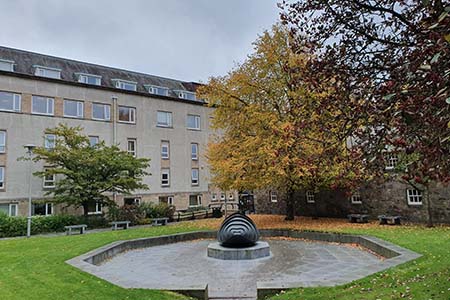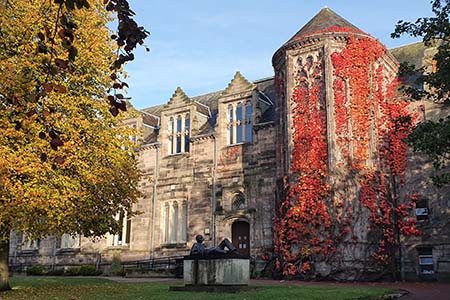Brage Thunestvedt Hatløy is a PhD fellow at the Faculty of Law, University of Bergen, and his project “Developments in commercial law and the law of obligations in the Norwegian Middle Ages” is based on legal historical comparison of Norwegian medieval sources. With the ATTR Mobility Grant, he could take his project abroad and add an international perspective on his research.
Studying legal history
It had long been my intention to include a perspective on Roman and Canon Law in the Middle Ages in my PhD project. A study of legal developments in medieval Europe immediately raises questions about how it stands in relation to the study and development of Roman and Canon Law in the early European universities.
With the help of the ATTR Mobility Grant, I was able to spend nearly four months at an institution with a long history of teaching and researching Roman and Canon Law.
Legal Culture
As a legal culture, Scotland has long traditions of studying and applying principles of Roman Law, and it is regarded as an integral part of their mixed legal culture. The University of Aberdeen thus had a long history of teaching and researching the subject, and was a natural choice.
I was introduced to the Centre for Scots Law at the Law School of the University of Aberdeen and its leader Dr. Andrew Simpson, who was a most welcoming host and ensured I from early on had access to the university’s resources, experts on Roman and Canon Law as well as medieval legal historians, and great writing conditions as an honorary lecturer.
A new field
 The study of Roman and Canon Law was a completely new field for me, as it is not usually taught in Norwegian universities, and in many ways, I had to start from the beginning. Thankfully, I had access to not only a well-stocked library of core texts on the field of Roman and Canon Law in Aberdeen, but I also got to discuss and learn about the subject from professors and lecturers in the field.
The study of Roman and Canon Law was a completely new field for me, as it is not usually taught in Norwegian universities, and in many ways, I had to start from the beginning. Thankfully, I had access to not only a well-stocked library of core texts on the field of Roman and Canon Law in Aberdeen, but I also got to discuss and learn about the subject from professors and lecturers in the field.
I presented my research project and the goals of my stay in Aberdeen to the Centre for Scots Law quite early in my stay, and I immediately received feedback and suggestions. Not only did this contribute to my understanding of the subject matter, but I also received input on how to utilize it in my PhD thesis.
Valuable knowledge for my thesis
The knowledge of Roman and Canon Law that I attained during my stay turned out to be very valuable for my thesis. As my research project primarily focuses on analysing the developments within a Norwegian context, it was not given in advance how the perspective of Roman and Canon Law in the Middle Ages would fit in.
However, by taking the core methodological approach of my thesis, a comparative legal historical approach, and using this to compare Norwegian and Roman legal sources, I was able to put the Norwegian medieval laws in a much wider context. This comparative approach resulted in a number of analyses, which I could combine with parts of my thesis that I had already written.
At the end of my research stay, I held a second presentation for the Centre for Scots Law, where I shared my methodology and research findings, which was favourably received.
Introduced to legal historians
 Thanks to my hosts in Aberdeen, I was introduced to legal historians from all of Scotland while I was there. I attended local and national seminars in Aberdeen and in Edinburgh, including the Scottish Legal History Conference and the Stair Society Annual Lecture, and the journeys to the capital were paid for with the ATTR Mobility Grant.
Thanks to my hosts in Aberdeen, I was introduced to legal historians from all of Scotland while I was there. I attended local and national seminars in Aberdeen and in Edinburgh, including the Scottish Legal History Conference and the Stair Society Annual Lecture, and the journeys to the capital were paid for with the ATTR Mobility Grant.
In addition to giving me a chance to meet and network with legal historians, I also gained an insight of what research questions and topics they were working on. I was particularly interested in the study of Scottish Medieval Legal History, a topic which I had several fascinating conversations about with members of the Centre for Scots Law and researchers from all over the United Kingdom.
The historically close links between Norway and the British Isles made for very productive and fascinating conversations, where we would compare elements of legal and political history.
Broadening my horizon
During my autumn in Aberdeen, I had a great time getting to immerse myself in an entirely new field of study and apply it to my research project.
It really helped me broaden my horizons to have conversations with researchers working on similar questions in a different country, and I have a new perspective on and understanding of my own research and the field I am working within as a result.
